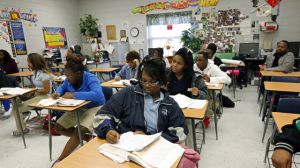Renee Moore teaches English at Mississippi Delta Community College. Elaine Weiss, the national coordinator for the Broader Bolder Approach to Education, contributed to this post.
I have taught in two different Mississippi Delta high schools, and now work in a community college.

Clarksdale High School students delve into the complexities of chemistry equations, in Clarksdale, Miss. (AP Photo/Rogelio V. Solis)
I once visited the three-room trailer home of one of my high-school students near the town of Alligator, Mississippi, which was housing 10 people — six of them young children. There were only two light fixtures: one in the kitchen, one in the bathroom. No tables, so they ate meals and did their homework on the kitchen floor.
In 1954, the Supreme Court’s Brown v. Board of Education decision identified segregation as the shameful and harmful toxin that it is. We have failed for 60 years to eradicate that toxin, with dire consequences for our schools.
Schools do not operate in a vacuum. Family circumstances that accompany students when they walk through the classroom door every day have a big impact on those students’ success. We all know this. But less often do we acknowledge that those students do not operate in a vacuum either; the communities in which they live have as big an impact on students’ learning as do their family circumstances. And when those communities are economically and racially isolated and segregated, schools face much larger challenges.
Even at the community college level, poverty’s effects sharply challenge the pursuit of education. Lack of transportation is a huge obstacle in this rural area. Students may walk four miles to get to school. I have seen kids walk in all kinds of weather. It’s heart wrenching to hear that they can’t make it to class or to lab or to get extra help because they have kids, or jobs they are trying to get to, or “my ride is leaving.”
Some reformers dismiss these as isolated issues, but when you see it over and over, you realize that it’s pervasive, and that people don’t know how to fight it or change it.
From the moment the Brown decision was delivered, political, civic, business and religious leaders across the Deep South adopted what became known as the “massive resistance” strategy. They refused to integrate schools, and did everything they could to stall the inevitable federal imposition of it. Local officials used all manner of diversions, impediments and excuses to either prevent desegregation or to sabotage its implementation so it could be deemed a “failure.” Indeed, most schools in the Mississippi Delta did not begin to desegregate until the late 1960s, and tens of thousands of black teachers and administrators across the South lost their jobs in retaliation.
We have not “abandoned” the mission, we never fully committed to it.
In 1995, 40 years after Brown, I was teaching at the black high school where my own children were enrolled. A colleague and I went dumpster diving at the other high school for the English textbooks they were throwing away, to get enough just for classroom sets for our students. The white high school had a fully equipped science lab; ours had no lab equipment or supplies. Decades of such inequities laid the foundation for today’s “failing schools.” They were designed to fail.
We can ratchet up accountability all we want, test students more often, and fire more teachers. That will likely cause more children to feel like failures, more dedicated and exhausted teachers to leave our schools, if not our profession, and fewer of our students to graduate from high school and become engaged, employed, productive citizens.
Fixing the complex, longstanding problems holding back our communities, however, will require acknowledging some harsh realities. Starting with the reality that we treat some children as if they are worth more and mine as if they are worth less, and that growing up and going to school in segregated, isolated communities makes success elusive. We must ensure that money – to pay teachers (and parents) well, to make classrooms engaging, and to ensure that all children are fed, housed and healthy – is available to all. We must stop advancing policies that promote individual “choice” at the expense of developing good, equitable public schools, that treat public schools like market commodities, and that reward outcomes like increased segregation.
Shifting to policies that incentivize integrated, diverse schools and neighborhoods and community-level investment in our most precious public good are critical steps toward fulfilling Brown’s mission. It’s not too late.



